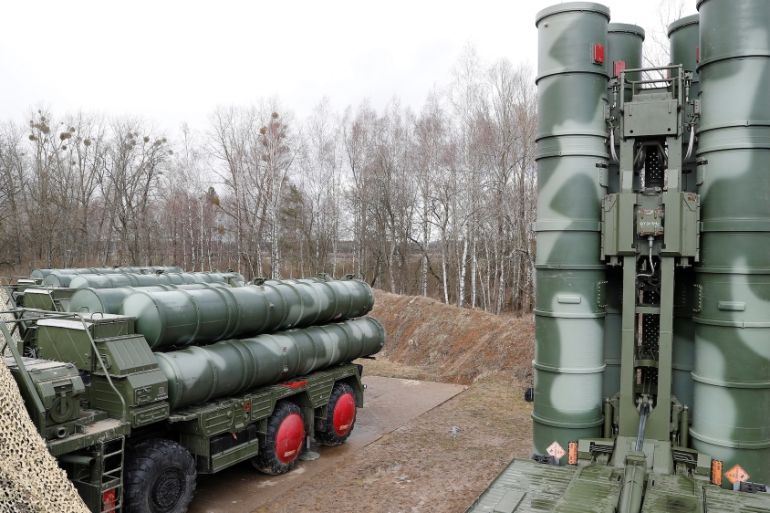Turkey tests Russian-made S-400 defence system: Reports
Tests of the advanced air defence system could stoke tensions between Turkey and the United States.

A missile has been fired into the sky on Turkey’s Black Sea coast where the military was expected to test its Russian-made S-400 defence systems, according to a video seen by Reuters.
The video, taken in the coastal city of Sinop on Friday, showed a narrow column of smoke headed high into the blue sky.
Keep reading
list of 3 itemsErdogan tells Trump: Turkey will not give up Russian S-400s
Russian S-400 missile delivery to India by end of 2021: Official
Turkey was widely expected to test the system this week, after issuing notices warning vessels and aircraft to avoid the area in the Black Sea.
A Haber television, an outlet close to the Turkish government, also reported the test on its website. Other Turkish media carried similar reports.
Turkey’s defence ministry said it would neither deny nor confirm missile tests.
Tests of the S-400s could stoke tensions between Turkey and the United States, which sharply opposed Ankara’s purchase of the weapons from Moscow on grounds they compromise shared NATO defence systems.
Washington reacted last year by suspending Turkey from its F-35 jet programme and has threatened sanctions.
On Friday, the US State Department warned of “potential serious consequences” for its security relationship with Turkey if it activates the system.
“If confirmed, we would condemn in the strongest terms the S-400 test missile launch as incompatible with Turkey’s responsibilities as a NATO ally and strategic partner of the United States,” State Department spokeswoman Morgan Ortagus said in a statement.
Defence analyst Turan Oguz told Reuters that a preliminary assessment of the colour, intensity, angle and route of the smoke in the video coincided with S-400 missiles. The angle of the column suggested the target “must not be too high,” he added.
Last year the Turkish military conducted radar tests of the surface-to-air defence system, which is among the world’s most advanced and can spot and track incoming aircraft at medium and long ranges.
In August, a Hellenic Air Force F-16 was targeted with the S-400’s radar when returning from a multinational military exercise, with Turkey being sharply rebuked for its actions against a fellow NATO ally.
Turkey signed the S-400 deal with Russia in 2017. Deliveries of the first four missile batteries, worth $2.5bn, began in July last year.
Turkey had initially said the S-400 would be operational in April but it has since delayed activating the system.
During a visit to Turkey earlier this month, NATO Secretary General Jens Stoltenberg reiterated that the Russian-made S-400 system cannot be integrated into the NATO air and missile defence system.